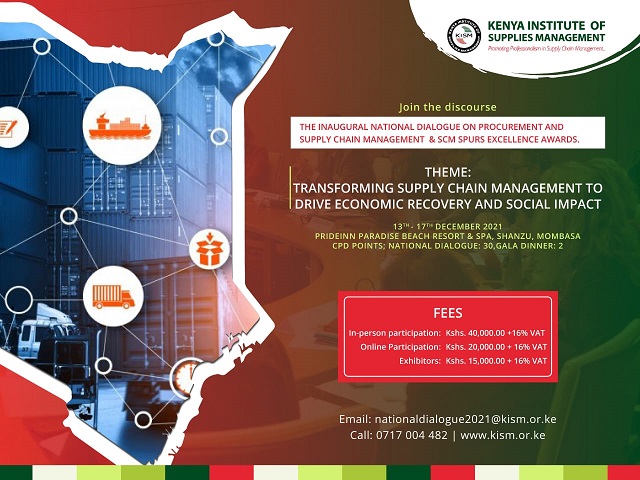2.1 General objective:
To catalyze actions, conversations, stakeholder engagements and thought leadership towards the transformation of supply chain management for impact.
Overall Objective
2.1.1 To demonstrate the link between Sound Supply Chain Management and attainment of Sustainable Socio-Economic Development in Kenya.
2.1.2 To establish a focused and well-informed caucus of transformed supply chain practitioners and stakeholders who are cognizant of prevailing policies and legislations and any gaps thereof.
2.1.3 To assess the progress of PPAD Act 2015 on public procurement.
2.1.4 To develop benchmarks and resources for necessary advice and support for stakeholders in supply chain management across the country and beyond.
2.1.5 To illustrate progress towards mainstreaming transformed supply chain management practices in Kenya and its impact on national, regional and global trade interactions.
2.1.6 To enhance Gender Inclusivity across all nodes of supply chain countrywide.
2.1.7 To assess the extent of national preparedness in adapting to agile supply chains resulting from changing dynamics in biological, environmental and socio-cultural threats
2.1.8 To assess the extent of national preparedness to align it to the evolving regional, continental and global dynamics in trade.
2.1.9 To assess the perception of the public about their role in the transformation of the procurement and supply chains.
2.2 Specific Objectives
2.2.1 To discuss and internalize the extent of attainment of Agenda 2063, UN Decade of Ecosystem Restoration 2021-2029; Vision 2030 and Kenya Constitution (2010) in relation to supply chain transformation agenda in Kenya.
2.2.2 To review socioeconomic impact of local content in Kenya.
2.2.3 To review the role of County Governments in enhancing sound PSCM under the devolved governance.
2.2.4 To create opportunities for stakeholder synergies in research and development of Supply Chain in Kenya.
2.2.5 To lobby and advocate for adoption of best practices in devolved procurement and supply chain.
2.2.6 To review impact of digital divide, technologies and innovations in PSCM.
2.2.7 To analyze diverse organizational knowledge for quality assurance in PSCM across the country.
2.2.8 To highlight the plight of women, youth and special groups in public procurement and supply chain in Kenya.
2.2.9 To share knowledge and experiences in PSCM practices in public, private and third sectors.
2.2.10 To review the SCM Curricula, Mentorship Programs and Rewarding Systems in Kenya and assess their applicability in PSCM practice.
2.2.11 To document lessons from notable and impactful Value Chains related to SMEs and Farmer-Led sustainable Supply Chain Models in the past 3 years in Kenya [Private Sector & NGO Case].
2.2.12 To review impact of COVID-19 on transformation of Supply Chain Management in Kenya.
2.2.13 To review the role of Funding agencies, Financial Institutions, Cooperatives and SACCOs in accelerating transformation of Supply Chain Management in Kenya.
2.2.14 To evaluate the established frameworks for procurement and supply in the regional, continental and global trade arena.
2.2.15 To evaluate the public perceptions about procurement and supply chains, and how they perceive themselves, as potential influencers in the envisaged transformation.
2.2.16 To assess contribution of roads, water, rail and air transport in accelerating supply chain transformation.

